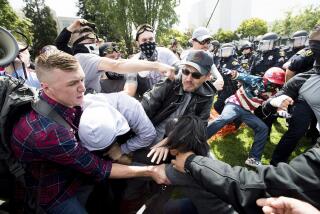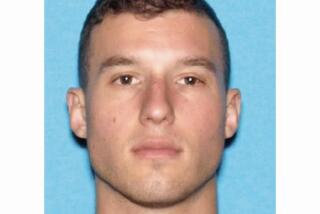Jurors to decide if man called for arson
- Share via
SAN DIEGO -- A federal jury began Monday deliberating the fate of environmental activist and ex-convict Rodney Coronado, accused of telling a group of vegans how to make a firebomb for use in “direct action” against those who abuse animals.
Assistant U.S. Atty. John Parmley, in his closing argument, told jurors that Coronado came to San Diego as a “recruiter and mentor of arsonists.”
Although Coronado did not specifically tell his audience to use firebombs, Parmley said the overall tone of his speech, in which he showed impatience with nonviolence as a means of forcing social change, was meant to encourage arson.
But Tony Serra, one of Coronado’s defense attorneys, said the speech on Aug. 1, 2003, did not include any suggestion that audience members engage in an immediate act of violence.
The law under which Coronado is being prosecuted makes it illegal to describe an incendiary or explosive device with the intent of encouraging “an activity that constitutes a federal crime of violence.”
Serra, a San Francisco attorney whose clients have included the Black Panthers and its co-founder, Huey Newton, told jurors that the 1st Amendment protects Coronado even if he is expressing opinions that most people find repulsive.
“His words were not calculated to incite imminent action,” Serra said. “You may hate his ideology but love more the precious concept of constitutional free speech.”
The investigation that led to Coronado’s indictment started with an arson fire that destroyed an upscale condominium under construction.
Fifteen hours later, Coronado, in answer to a question from a member of the audience after his speech, told the vegan group how he built the incendiary device that gutted an animal research laboratory at Michigan State University in 1992, a crime for which he served four years in prison.
The arsonist who burned the San Diego condo project, causing $50 million in damage, has not been caught, and no one was hurt in the blaze.
But a 12-foot banner was left behind by the Earth Liberation Front, an organization labeled by the FBI as a terrorist group. The sign read: “If you build it, we will burn it. The ELFs are mad.”
Coronado, who was the group’s spokesman, is not a suspect in the fire, authorities said.
The San Diego trial was delayed until Coronado, who lives in Tucson, finished an eight-month jail term in Arizona for disrupting a government-sponsored expedition to hunt mountain lions by breaking traps and spreading mountain lion urine to create false trails for hunters.
A charismatic figure in the animal liberation movement, Coronado, 41, traces his activism concerning the protection of animals and open spaces to his heritage as an American Indian. He has spoken of arson as a “very sacred act.”
If convicted of the San Diego charge, he could face 20 years in prison. U.S. District Judge Jeffrey Miller, in his instructions to jurors, said Coronado can be convicted only if jurors are convinced his explanation of bomb-making was meant to encourage “an imminent lawless action” by members of his audience.
Coronado has characterized his speech that day as his standard environmental and animal rights speech. He said the administration furthers corporate interests at the expense of the environment and referred to the president as “Emperor Bush.”
Unequivocal information about Coronado’s speech, and the audience reaction, was difficult to obtain.
The event organizer videotaped it, but the camera battery failed before the question-and-answer session.
The case is a holdover from the tenure of former U.S. Atty. Carol Lam, who was among seven U.S. attorneys nationwide fired by the Bush administration.
Lam jailed two vegans for 80 days in 2005 for refusing to testify to the grand jury that later indicted Coronado.
“Teaching people how to build explosives in order to commit violent crimes is unacceptable in civilized society,” Lam said in announcing Coronado’s indictment on Feb. 22, 2006. “There is no excuse for it.”
During the three-day trial, two undercover officers who attended Coronado’s widely publicized speech disagreed on whether the word “bomb” was mentioned by the person who posed the question. Coronado did not testify, but jurors were shown a tape of him being interviewed on the CBS-TV show “60 Minutes.”
The statute under which Coronado is being prosecuted was adopted by Congress in the wake of the 1995 bombing of the Alfred P. Murrah Federal Building in Oklahoma City.
--
More to Read
Sign up for Essential California
The most important California stories and recommendations in your inbox every morning.
You may occasionally receive promotional content from the Los Angeles Times.













